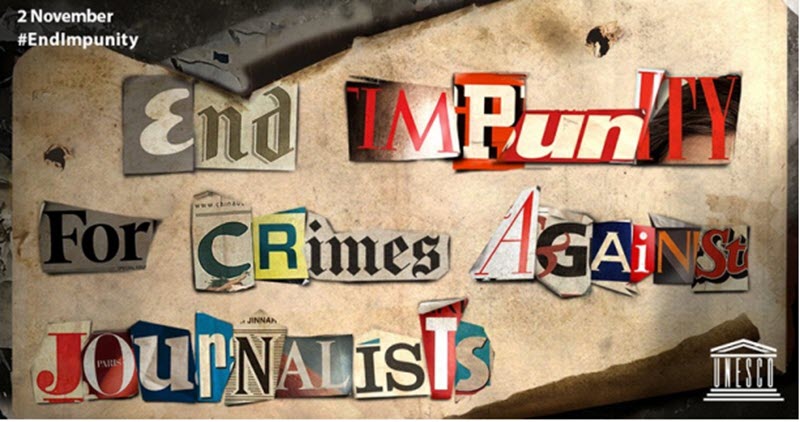BACKGROUND
The United Nations General Assembly proclaimed 2 November as the ‘International Day to End Impunity for Crimes against Journalists’ in General Assembly Resolution A/RES/68/163. The Resolution urged Member States to implement definite measures countering the present culture of impunity. The date was chosen in commemoration of the assassination of two French journalists in Mali on 2 November 2013.
This landmark resolution condemns all attacks and violence against journalists and media workers. It also urges Member States to do their utmost to prevent violence against journalists and media workers, to ensure accountability, bring to justice perpetrators of crimes against journalists and media workers, and ensure that victims have access to appropriate remedies. It further calls upon States to promote a safe and enabling environment for journalists to perform their work independently and without undue interference.
MESSAGE FROM SECRETARY GENERAL OF THE UN, ANTONIO GUTIERRES
On this year’s International Day to End Impunity for Crimes Against Journalists, the world, including the media, faces an entirely new challenge: COVID-19.
The pandemic has highlighted new perils for journalists and media workers, even as the number of attacks on their physical safety has grown. There were at least 21 attacks on journalists covering protests in the first half of 2020 – equal to the number of such attacks in the whole of 2017. There have also been additional constraints on the work of journalists, including threats of prosecution, arrest, imprisonment, denial of journalistic access and failures to investigate and prosecute crimes against them.
When journalists are targeted, societies as a whole pay a price. If we do not protect journalists, our ability to remain informed and make evidence-based decisions is severely hampered. When journalists cannot do their jobs in safety, we lose an important defence against the pandemic of misinformation and disinformation that has spread online.
Fact-based news and analysis depend on the protection and safety of journalists conducting independent reporting, rooted in the fundamental tenet: “journalism without fear or favour”.
As the world fights the COVID-19 pandemic, I reiterate my call for a free press that can play its essential role in peace, justice, sustainable development and human rights.
SPECIAL NOTE FOR ARUBA
On December 23, 2010, TV program presenter and investigative journalist Johnny (“Poentje”) Castro was killed by two gunshots at point blank range in the garden of his home in Aruba.
Considering the fact that a member of the press corps was murdered, a special criminal investigation team (TGO, Team Grootschalig Onderzoek) was created, and the Dutch Forensic Institute involved to examine various items, including the cellphone of the victim.
Poentje Castro was a well known person in the community, because of his TV Program “Un Dia den Bida” in which he would interview or document people from all walks of life who had an interesting story to tell.
Castro gained fame and notoriety, the former because of his skills to document controversial issues, including a documentary on the life of an Aruba inmate in a prison controlled by the prisoners in the state of Falcon, Venezuela, based entirely on secretly recorded telephone calls.
Castro also got embroiled in a controversial issue which was never fully clarified by the authorities, involving his possession of a laptop, obtained from a local popular musician, which laptop according to reports contained child pornography material.
Castro was also acquainted with Dutch reporters who had covered the Natalee Holloway case and Joran van der Sloot, and managed to secretly record conversations with alleged persons of interest or sources with alleged information about Joran van der Sloot’s involvement in the Natalee Holloway disappearance.
In 2013, the Office of the Prosecution Service in Aruba admitted having no concrete leads, or persons of interest or possible suspects yet in the Poentje Castro murder case.
In 2015, a local man, Francis Dijkhoff accused former Minister of Tourism Otmar Oduber of having been directly involved in the murder of Poentje Castro, giving details about several possible reasons, the most conspicuous being drug rings operating at musical concerts and electric festivals in Aruba, and associated large scale drug trafficking through shipping containers to and from Aruba.
Dijkhoff was forced to retract all accusations against Oduber in a slander and defamation summary court case initiated by Otmar Oduber.
According to the Office of the Prosecution Service the case remains open, but as yet with no progress made since 2015, and no additional information has been disclosed since 2015.
This case is highly controversial, because in conversations Rainbow Warriors Core Foundation sustained with various local journalists, many were reluctant to discuss the case openly and candidly, hinting at a possible cover up and the protection of high profile persons from criminal investigation by the same Office of the Prosecution Service under political pressure.
While the public consensus is that Castro was killed for either personal reasons or indeed knowledge of organized crime activities related to drug trafficking, the fact remains that Castro also had knowledge of child pornography and possibly pedophile rings in Aruba.
In the Netherlands the notorious Demmink affair involving high ranking justice officials being accused of pedophile activities, spanning a period from 1997 till around 2014, reads like a Hollywood plot of the underbelly of society and the rich and political elite entwined in a world of intrigue, sexual abuse of minors, political strong arming tactics and above all cover ups.
Psychologist Rita Zecher Enahoro, who worked at the Office of the Prosecution Service in Aruba on cases of sexual abuse of minors, in her book “Boa. Aruba in de wurggreep” gives an ugly and gripping account of her findings about sexual abuse of minors and in particular sketches an appalling image of “the stranglehold of the all powerful pedophile rings in Aruba, and who control the judiciary”.
The Jeffrey Epstein case, which allegedly also involves pedophile rings operated in various well-known, but not named Caribbean islands, and the revelations by Zecher Enahoro hint at other plausible motives for silencing Castro.
Fact of the matter is that the case remains unsolved to this date, with no urgency to resolve this murder ten years after the crime was committed.


